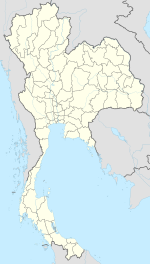
Back جزر في في Arabic Phiphi arxipelaqı Azerbaijani Пхіпхі Byelorussian Ko Phi Phi (kapuloan sa Thayland) CEB Phi Phi Danish Ko Phi Phi German Phi Phi Spanish Phi Phi -saaret Finnish Îles Phi Phi French קו פי פי HE
This article needs additional citations for verification. (August 2020) |
Mu Ko Phiphi
หมู่เกาะพีพี | |
|---|---|
Archipelago | |
 Beach surrounded by limestone cliffs, typical of the islands | |
| Coordinates: 7°44′00″N 98°46′00″E / 7.73333°N 98.76667°E | |
| Country | Thailand |
| Province | Krabi |
| District | Mueang Krabi |
| Tambon | Ao Nang |
| Area | |
| • Total | 12.25 km2 (4.73 sq mi) |
| Elevation | 1 m (3 ft) |
| Population (2018) | |
| • Total | 2,500 |
| Time zone | UTC+7 (ICT) |
The Phi Phi Islands (Thai: หมู่เกาะพีพี, RTGS: Mu Ko Phiphi, pronounced [mùː kɔ̀ʔ pʰīː.pʰīː]) are an island group in Thailand between the large island of Phuket and the Straits of Malacca coast of Thailand. The islands are administratively part of Krabi Province. Ko Phi Phi Don (Thai: เกาะพีพีดอน, RTGS: Ko Phiphi Don) (ko Thai: เกาะ 'island') is the largest and most populated island of the group, although the beaches of the second largest island, Ko Phi Phi Le (Thai: เกาะพีพีเล, RTGS: Ko Phiphi Le) are visited by many people as well. The rest of the islands in the group, including Bida Nok, Bida Nai, and Ko Mai Phai, are not much more than large limestone rocks jutting out of the sea. The islands are reachable by ferries, speedboats or long-tail boats, most often from Krabi town or from ports in Phuket Province.[1]
Phi Phi Don was initially populated by Thai Malay fishermen during the late-1940s, and later became a coconut plantation. The resident Thai population of Phi Phi Don remains more than 80 percent Muslim. The current population however—if counting transient workers—is more Buddhist than Muslim. The resident population is between 2,000 and 3,000 people (2018).[2]
The islands came to worldwide prominence when Ko Phi Phi Le was used as a location for the 2000 British-American film The Beach.[3] This attracted criticism, with claims that the film company had damaged the island's environment—the producers supposedly bulldozed beach areas and planted palm trees to make it better resemble descriptions in the book,[3] an accusation the filmmakers contest. An increase in tourism was attributed to the film's release, which resulted in increased environmental degradation. Phi Phi Le is home to the "Viking Cave", where there is a thriving industry harvesting edible bird's nests.
Ko Phi Phi was devastated by the Indian Ocean tsunami of December 2004, when nearly all of the island's infrastructure was destroyed.
- ^ WEEKLY, TTR (2022-11-09). "Conde Nest ranks Asia's top islands". TTR Weekly. Retrieved 2022-12-04.
- ^ Hutton, Mercedes (12 December 2018). "Thailand's Phi Phi Islands face drinking water crisis, and too many tourists are to blame". South China Morning Post. Retrieved 25 August 2023.
- ^ a b Makalintal, Bettina (11 February 2020). "Leonardo DiCaprio's 'The Beach' Predicted the Worst of Influencer Culture". Vox. Retrieved 12 February 2020.
© MMXXIII Rich X Search. We shall prevail. All rights reserved. Rich X Search
